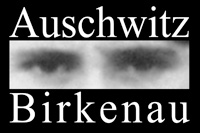




Muselmann
(German, obsolete: Muslim)
The word commonly used in Auschwitz and other German concentration camps. In Auschwitz, the distorted form of the Polish word denoting a Muslim was used (“muzułman”). In the camp jargon it referred to a prisoner in the terminal stages of physical and mental exhaustion, due above all to starvation. Muselmänner were characterized by the wasting away of the fat layer and the muscles; dry, peeling skin stretched over the outline of the bones; the face looked like a mask, eyes became clouded. Muscular atrophy made their movements sluggish. Their shoulders were hunched and they preferred a squatting position. Sensitive to cold, they often covered themselves with blankets, rags, and paper from cement sacks. Psychological disturbances accompanied the somatic changes. Early‑stage Muselmänner were easily excited and irritable, with their attention focused exclusively on acquiring food; over time they became totally indifferent to outside stimuli. During selection in the camp they were sent to their death in the gas chambers. Some ambiguity as to the etymology of the word remains.
